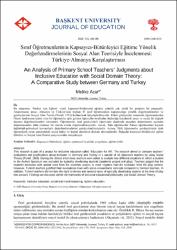Please use this identifier to cite or link to this item:
https://hdl.handle.net/20.500.11779/1566| Title: | Sınıf Öğretmenlerinin Kapsayıcı-bütünleyici Eğitime Yönelik Değerlendirmelerinin Sosyal Alan Teorisiyle İncelenmesi: Türkiye-almanya Karşılaştırması |
| Authors: | Acar, Melike |
| Keywords: | Kapsayıcı-bütünleyici eğitim Eğitim hakkı Toplumsal ve ahlaki sorgulama |
| Publisher: | Başkent Üniversitesi |
| Source: | Acar, M. (2020). Sınıf Öğretmenlerinin Kapsayıcı-Bütünleyici Eğitime Yönelik Değerlendirmelerinin Sosyal Alan Teorisiyle İncelenmesi: Türkiye-Almanya Karşılaştırması. Başkent University Journal of Education, 7(2), ss.189-199. |
| Abstract: | Bu araştırma, ‘Herkes için Eğitim’ isimli kapsayıcı-bütünleyici eğitime yönelik çok yönlü bir projenin bir parçasıdır. Araştırmanın amacı Almanya ve Türkiye’deki toplam 43 sınıf öğretmeninin kapsayıcılığa yönelik değerlendirmeleri ve gerekçelerinin Sosyal Alan Teorisi (Turiel, 1983) kullanılarak karşılaştırılmasıdır. Klinik görüşmeler esnasında öğretmenlerden Otizm Spektrumu içinde olan bir öğrencinin tipik gelişen öğrenciler tarafından dışlandığı (akademik proje ve oyun) iki değişik durumu değerlendirmeleri istenmiştir. Öğretmenler, özel gereksinimli öğrencinin akademik projeden dışlanmasını oyundan dışlanmasından daha olumsuz bir durum olarak değerlendirmişlerdir. Ancak, Türk öğretmenler Alman öğretmenlere kıyasla toplumsal-geleneksel kavramlarla değerlendirmelerini gerekçelendirmişlerdir. Ayrıca, Türk öğretmenler gerekçelerinde tipik öğrencilerin oyun zamanındaki seçim hakkı ve kişisel alanlarını dikkate almamışlardır. Bulgular kapsayıcı-bütünleyici eğitim felsefesi ve Sosyal Alan Teorisi çerçevesinden tartışılmıştır. This research is part of a project for inclusive education called 'Education for All'. The research aimed to compare teachers’ evaluations and justifications about inclusion in Germany and Turkey in a sample of 43 classroom teachers by using Social Theory (Turiel, 1983). During the clinical interviews, teachers were asked to evaluate two different situations in which a student in the Autism Spectrum was excluded by typically developing students (academic project and play). Teachers judged that the student's exclusion with special need from the academic project as more negative than the exclusion from the play context. However, Turkish teachers justified their evaluations more with social-conventional concepts compared to German teachers. In addition, Turkish teachers did not take the right to choose and personal areas of typically developing students at the time of play into account. Findings are discussed within the framework of inclusive-educational philosophy and Social Domain Theory. |
| URI: | https://hdl.handle.net/20.500.11779/1566 |
| ISSN: | 2148-3485 2148-3272 |
| Appears in Collections: | Rehberlik ve Psikolojik Danışmanlık Koleksiyonu TR-Dizin İndeksli Yayınlar Koleksiyonu / TR Dizin Indexed Publications Collection |
Files in This Item:
| File | Description | Size | Format | |
|---|---|---|---|---|
| 9465a277-49b1-4923-945e-4c7a6e266d3e.pdf | Full Text - Article | 378.92 kB | Adobe PDF |  View/Open |
CORE Recommender
Sorry the service is unavailable at the moment. Please try again later.
Items in GCRIS Repository are protected by copyright, with all rights reserved, unless otherwise indicated.